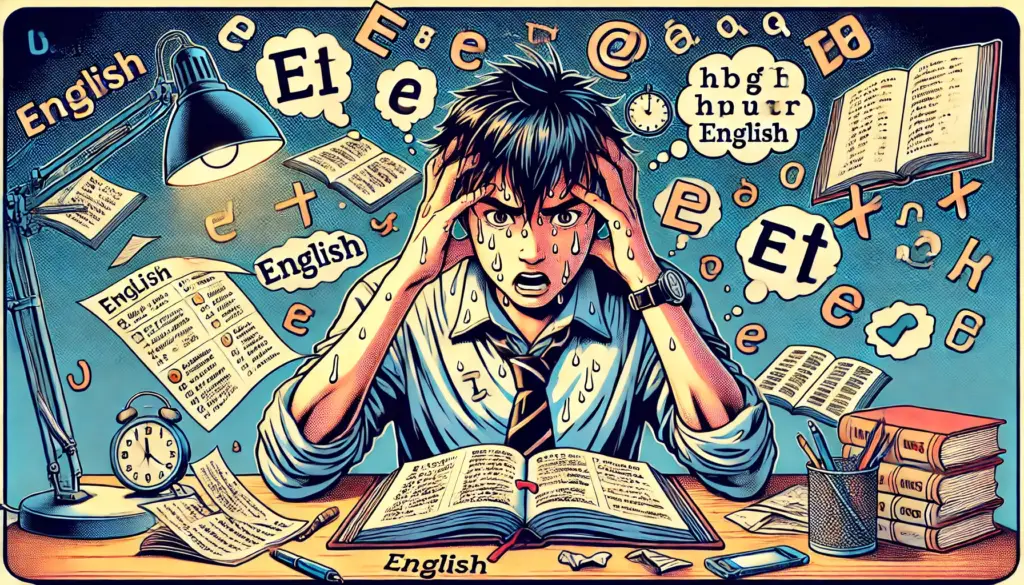
Learning a foreign language is always a challenge—but for Japanese learners, English often feels like an especially steep uphill battle. It’s not just about tricky grammar or hard-to-pronounce words. The real reason goes deeper: English and Japanese are languages from completely different worlds.
Understanding this isn’t just comforting—it’s empowering. Here’s why English feels so foreign to many Japanese speakers, and how that reflects the nature of language itself.
🌏 Two Languages, Two Worlds
Unlike many Western languages that share common ancestry, Japanese and English evolved separately. English is part of the Indo-European language family, sharing roots with German, French, Spanish, and many more. These languages often have similar grammar patterns, related vocabulary, and even shared idioms.
Japanese, however, is a language isolate. It doesn’t belong to the Indo-European family—or to any widely agreed-upon family at all. That means it has no shared history with English. For learners, this means there are no recognizable word roots, no overlapping sentence structures, and no grammatical shortcuts. Every aspect must be learned from scratch.
In this way, English can feel like learning a brand-new way to think.
🔄 Grammar Flip: SOV vs. SVO
English sentences usually follow a Subject-Verb-Object order. For example:
I eat sushi.
Japanese, however, uses Subject-Object-Verb:
私は寿司を食べる。 (Watashi wa sushi o taberu.)
This reversal forces learners to reshape how they construct thoughts. In Japanese, the verb always comes last, and much of the sentence can be implied or omitted. English, on the other hand, values clarity and directness. The constant need to be explicit in English feels unnatural to many Japanese learners who are used to reading between the lines.
🔉 Sounds You’ve Never Heard Before
Pronunciation is another major hurdle. Japanese has a relatively limited set of sounds, and it doesn’t distinguish between “R” and “L” the way English does. Sounds like “th,” “v,” or even certain consonant blends don’t exist in Japanese phonetics.
Moreover, English allows for consonant clusters—like “street” or “spring”—that are awkward or even unpronounceable using Japanese sound patterns. To adapt, many Japanese speakers insert vowels between consonants, turning “black” into “burakku,” for example. This creates a disconnect when trying to pronounce or recognize English words accurately.
🧠 The Mental Load of Switching Scripts
English uses a simple 26-letter Roman alphabet. Japanese, in contrast, uses three writing systems simultaneously:
- Hiragana (phonetic native script)
- Katakana (used mostly for foreign words)
- Kanji (Chinese characters with multiple readings)
Reading and writing Japanese requires memorizing thousands of kanji, which can drain cognitive resources that might otherwise be used to focus on acquiring English. When switching between writing systems, Japanese learners are essentially rewiring their brains each time.
🎓 Classroom English vs. Real English
For decades, English education in Japan focused on test preparation. Students learned grammar rules and vocabulary to pass entrance exams—not to communicate. As a result, many Japanese people can read English fairly well but struggle with speaking or listening.
Add to that a cultural tendency toward perfectionism and fear of making mistakes, and it’s no surprise that many avoid speaking unless they feel 100% ready—which rarely happens in language learning.
In real-world terms, many Japanese learners have never had the chance to use English naturally, casually, or emotionally.
🔁 The Feeling Is Mutual: Why English Speakers Struggle With Japanese
Ironically, native English speakers often feel the exact same way about learning Japanese.
They encounter a completely foreign sentence structure, an unfamiliar writing system, and a sound system based on pitch accent rather than stress. Japanese has almost no recognizable vocabulary to an English speaker. Learning it can feel like decoding a new universe.
This mutual difficulty helps prove one thing: the struggle is not personal—it’s structural. You’re not “bad at English”—you’re tackling one of the hardest combinations in language learning.
✅ But It’s Not All Bad News
While English is undeniably tough for Japanese learners, some aspects are surprisingly accessible.
1. Katakana Loanwords
Many English words are already part of everyday Japanese life—just written in katakana. Words like “computer,” “camera,” and “coffee” may sound slightly different, but the core meaning is instantly familiar.
These borrowed words (called gairaigo) act as small victories. They create moments of recognition and confidence.
2. Simple Sentence Patterns
English has a number of simple and highly useful sentence forms. Phrases like “I like X,” “This is Y,” and “I can’t Z” give learners usable tools from day one. With practice, these can form the backbone of early communication.
3. Easy Verb Tenses (Compared to Japanese Honorifics)
While English has several tenses and irregular verbs, it lacks something uniquely difficult in Japanese: the complex system of honorific and humble language (keigo). For learners who have struggled with polite speech in Japanese, English verbs may feel refreshingly direct.
✨ What This Tells Us About Language Learning
So what can we take away from all this?
- Struggling is normal. If English feels confusing or distant, that’s not your fault—it’s expected when crossing such a wide linguistic gap.
- Progress is possible. Even though English and Japanese come from different worlds, humans are wired for language. With exposure, immersion, and support, you will get better.
- Empathy goes both ways. Japanese learners of English and English learners of Japanese are walking mirrored paths. Respect and encouragement from both sides can build a shared understanding of just how hard—and beautiful—language learning can be.
💡 Tips for Japanese Learners of English
| Strategy | Benefit |
|---|---|
| Focus on speaking early | Builds confidence and real communication skills |
| Use loanwords as anchors | Familiarity speeds up vocabulary learning |
| Watch English shows with Japanese subtitles | Reinforces natural phrasing and rhythm |
| Record your voice and listen back | Improves awareness of pronunciation gaps |
| Don’t fear mistakes | Every error is a step toward fluency |
Final Thoughts
English is hard for Japanese speakers for a reason. The two languages have no shared roots, no structural overlap, and no phonetic similarities. But that very distance also offers insight into the incredible diversity of human language.
If you’re a Japanese learner of English, know this: your struggle isn’t a sign of weakness—it’s a testament to your strength. You are learning not just a new language, but a new way to see the world.
Keep going. Your brain is already doing something amazing. 🌱🌏





















































